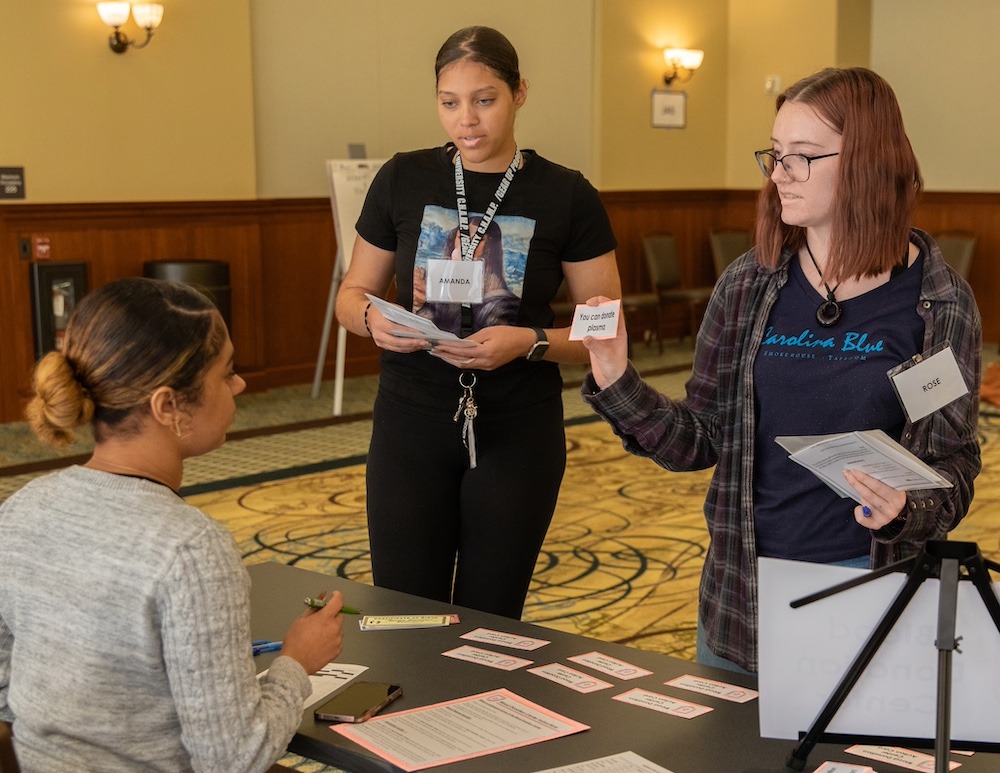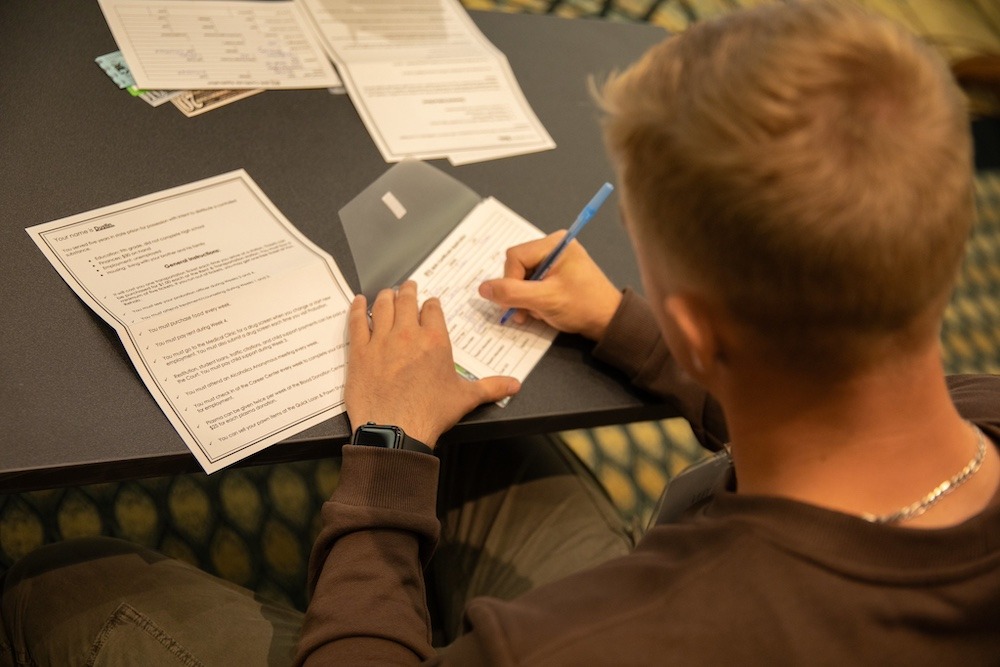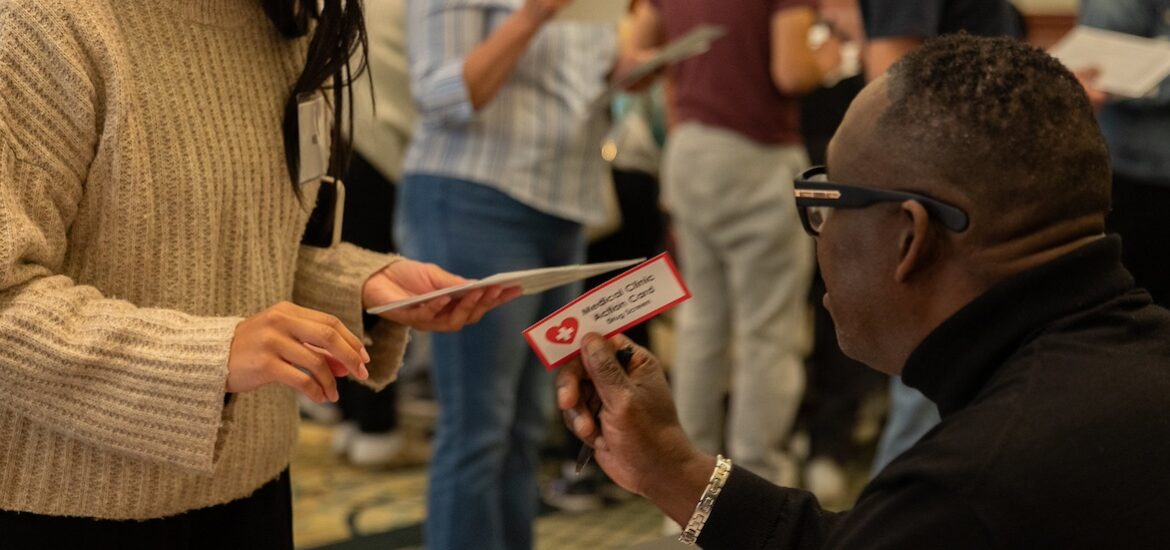Pre-Professional Activity For Law & Justice Majors Hosted in Tandem with the Federal Government
What is the experience like when someone has to reintegrate with the community after time in prison?
Law and justice studies majors experienced some of the difficulties of leaving prison firsthand during a Prisoner Reentry Simulation held on campus. This free, pre-professional learning opportunity was hosted by Rowan’s Law & Justice Studies Department and the U.S. Attorney’s Office of New Jersey and Eastern Pennsylvania.
Dr. Kimberly Houser, one of the leaders of the event, reflected on the importance of teaching students about what it’s like to reenter society from prison.
“Why do 83% of people go back into prison?” she said. “Well, part of it is, it’s really difficult to navigate getting back into the community, whether it’s finding a job, whether it is getting your Social Security card, all these different things that people don’t think about.”
So in conjunction with the federal government, Rowan hosted the event to give students the ability to walk in the shoes of people going through their lives after prison. They received a “wallet,” which gives each person a story.
“[The wallet] tells you what you have been incarcerated for,” Dr. Houser said, “It gives you a little bit of a bio sketch. It gives you a certain amount of money. Some have a birth certificate, some won’t, and you have a checklist and you have to accomplish those checklists within 15 minutes.”

Students Share Their Reactions
Michael L., a junior law and justice major, found his wallet disheartening.
“My guy was basically a drug dealer, and he had a family, all this stuff. And he had nothing to his name,” he said.
Students worked to complete the checklist by going to different stations around the ballroom. Tasks included going to a clinic for a drug test, going to Alcoholics Anonymous (AA) meetings, and basic living tasks.
Students found the simulation difficult to stomach, with completing the needed checklist items assigned to them frustrating. Some, like Lieze’s assigned simulated person, turned back to a life of crime.
“At first I tried to do it legit and try to get a job and all this,” Michael said, “And I failed a drug test. Then I went and robbed the bank, and then I successfully robbed the bank.”
Dr. Houser found that Michael’s experience wasn’t an isolated one.
“[The students are] frustrated. They’re asking for help. They’re angry,” Dr. Houser said. “It’s amazing how quickly, within 15 minutes you have got yourself so engrossed, you have become this person, this identity. And they’re frustrated because they can’t get from point A to point B in the time that they need to.”

Dr. Houser also recalled a student who had a particularly difficult time.
“One girl said, ‘I can’t pay the rent,’” she said. “‘It’s not that I don’t pay the rent. I don’t have $400 to pay it.’”
Insight That Students Gained
Students that participated in the event, found more of a genuine understanding and empathy for those coming out of prison.
“I would never know. Like having … to go pay child support or having to wait at a food bank or something to get food,” Michael said. “The struggles of getting ID and all that stuff and the Social Security card and trying to make ends meet without trying to commit crime.”
When all was said and done, the Law & Justice Studies Department gave students the chance to walk in the footsteps of people just trying to get by after serving their time which has proven a lot different than learning from a book. There’s a new understanding of the pressure and difficulty of reentry, and why there are so many people who go back to prison.
“You’ve got your foundation,” Dr. Houser said. “But if you live it … it takes what you’ve learned and it puts it to a whole new level.”
Check Out A Related Story On Experiential Learning At Rowan
Video and written story by:
Gavin Schweiger
Senior Radio, Television & Film major
Minors in German Studies and Journalism
Photography by:
Valentina Giannattasio
Senior, double major Marketing and Dance
Internship & Experiential Learning Stories
Learn how Rowan Profs go Beyond the Classroom to grow professionally, as well as personally, through internships and other experiential learning. Experiential learning includes hands-on learning opportunities provided through research, student clubs, campus leadership, student worker jobs, service-learning projects and volunteerism. In addition, Rowan’s Office of Career & Professional Development provides career support that’s more than just advice – it’s events, connections and real guidance to help students thrive after college.

